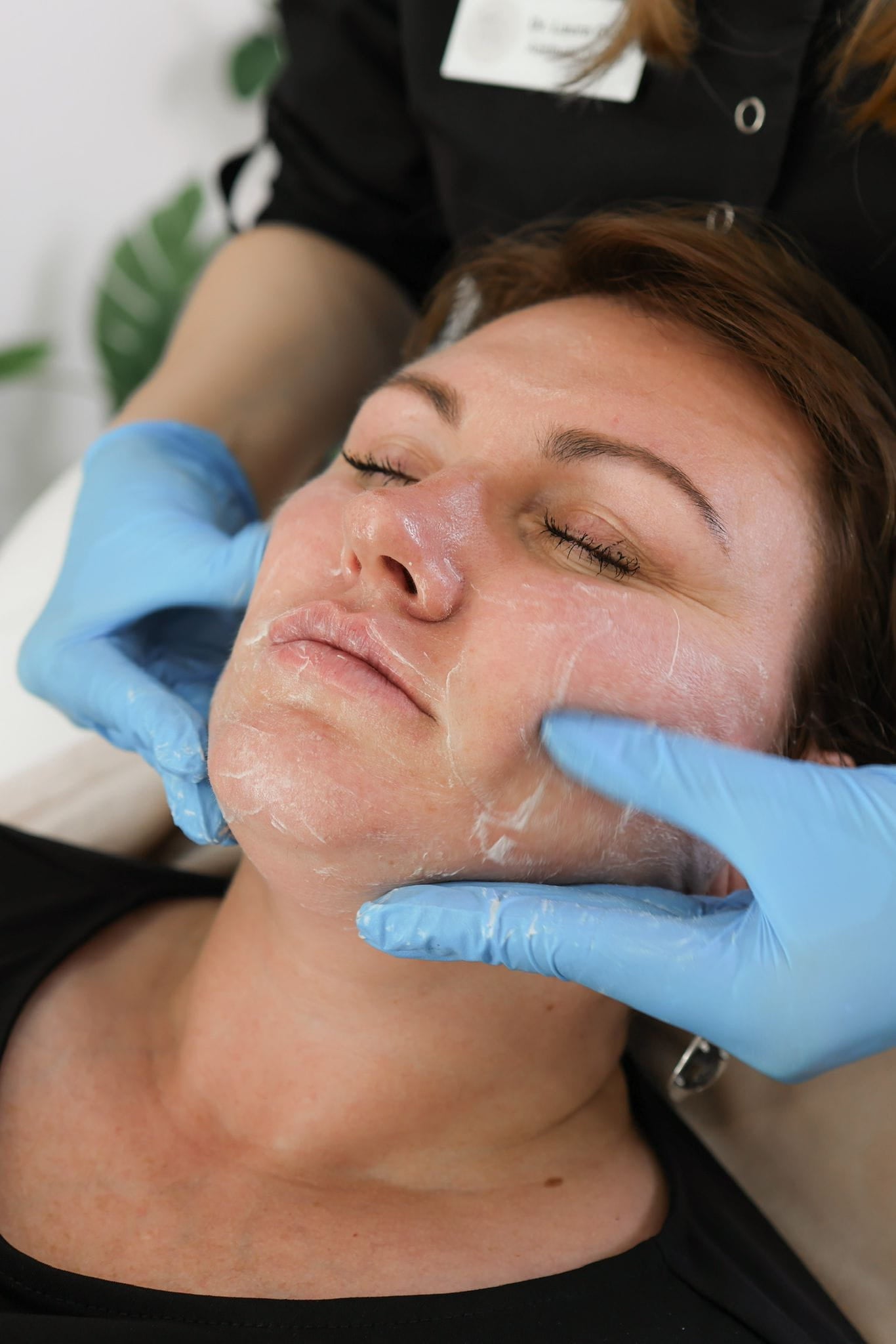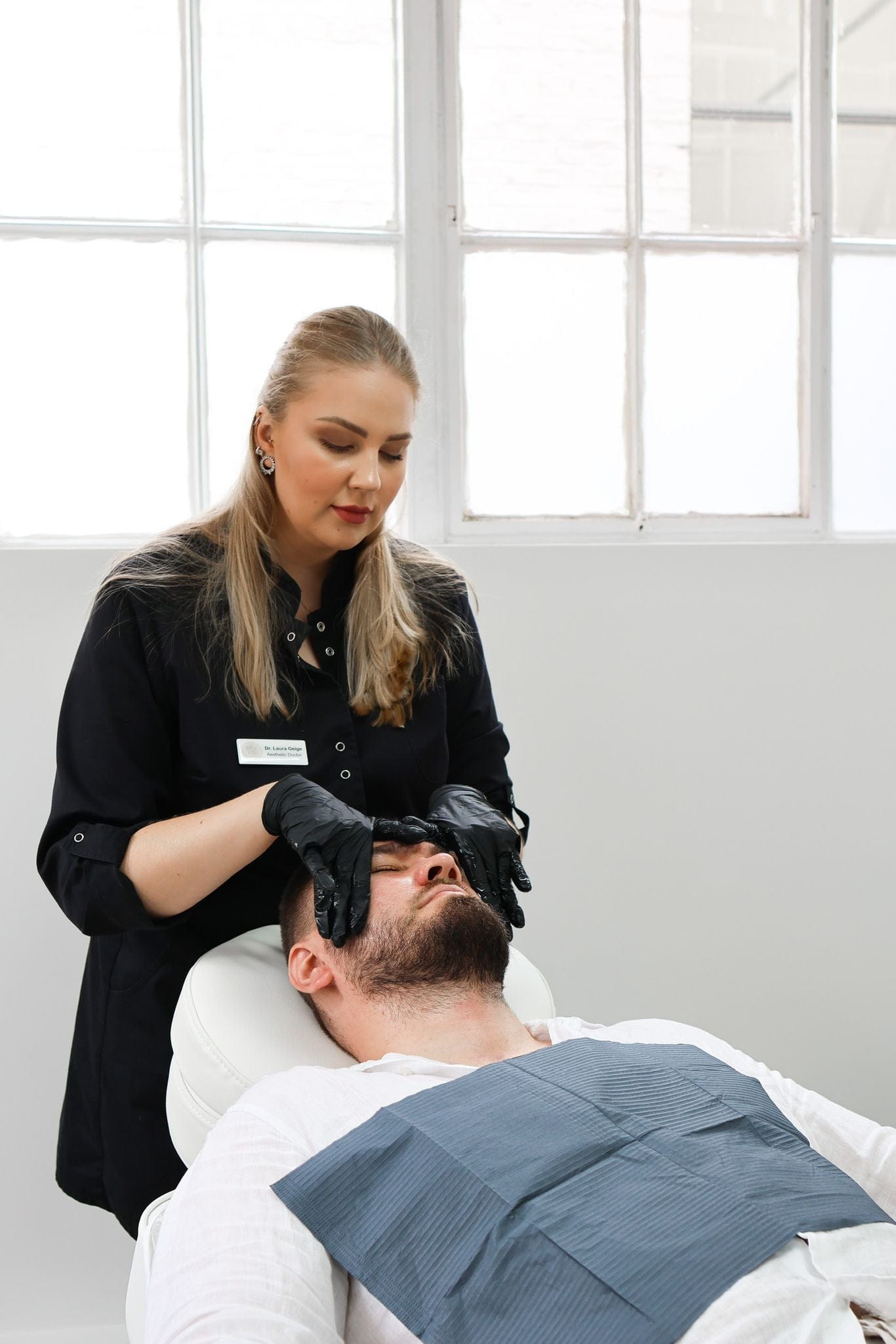Cosmelan and Sun Damage
Sun damage, often manifested as hyperpigmentation or age spots, can significantly affect skin appearance and confidence. Cosmelan depigmentation peel has emerged as a popular treatment option for addressing these concerns.
What is Cosmelan?
Cosmelan is a professional-grade depigmentation treatment designed to target hyperpigmentation, including melasma, sunspots, and post-inflammatory pigmentation. It works by inhibiting melanin production and exfoliating the skin to reveal a more even complexion.
- Cosmelan utilizes a blend of ingredients, such as kojic acid, phytic acid, and retinol, known for their depigmenting properties.
- The treatment involves applying a peel mask that is left on the skin for a specific duration before being neutralized.
How Does Cosmelan Work?
Cosmelan is a professional-grade depigmentation treatment designed to target hyperpigmentation, including melasma, sunspots, and post-inflammatory pigmentation. It works by inhibiting melanin production and exfoliating the skin to reveal a more even complexion.
- Cosmelan utilizes a blend of ingredients, such as kojic acid, phytic acid, and retinol, known for their depigmenting properties.
- The treatment involves applying a peel mask that is left on the skin for a specific duration before being neutralized.
While Cosmelan can be effective in treating sun damage, it’s important to note that results vary depending on individual skin type, severity of pigmentation, and adherence to post-treatment care. Consulting with a qualified dermatologist or skincare professional is crucial to determine if Cosmelan is an appropriate treatment option and to receive personalized recommendations.
Sun Damage in the UK
Sun damage is a prevalent concern in the UK due to the country’s climate, which includes periods of strong sunlight exposure.
The sun’s ultraviolet (UV) rays can penetrate the skin and cause damage to melanin-producing cells, leading to hyperpigmentation, also known as age spots or sunspots.
These darkened areas appear on the skin and can affect self-confidence and skin aesthetics.
Effectiveness of Cosmelan for Sun Damage
Cosmelan is a professional-grade depigmentation treatment designed to target hyperpigmentation, including melasma, sunspots, and post-inflammatory pigmentation. It works by inhibiting melanin production and exfoliating the skin to reveal a more even complexion.
Cosmelan utilizes a blend of ingredients, such as kojic acid, phytic acid, and retinol, known for their depigmenting properties. The treatment involves applying a peel mask that is left on the skin for a specific duration before being neutralized.
While Cosmelan can be effective in treating sun damage, it’s important to note that results vary depending on individual skin type, severity of pigmentation, and adherence to post-treatment care. Consulting with a qualified dermatologist or skincare professional is crucial to determine if Cosmelan is an appropriate treatment option and to receive personalized recommendations.
Procedure and Aftercare
Sun damage, often manifested as hyperpigmentation or age spots, can significantly affect skin appearance and confidence. Cosmelan depigmentation peel has emerged as a popular treatment option for addressing these concerns.
Cosmelan is a professional-grade depigmentation treatment designed to target hyperpigmentation, including melasma, sunspots, and post-inflammatory pigmentation. It works by inhibiting melanin production and exfoliating the skin to reveal a more even complexion.
Cosmelan utilizes a blend of ingredients, such as kojic acid, phytic acid, and retinol, known for their depigmenting properties. The treatment involves applying a peel mask that is left on the skin for a specific duration before being neutralized.
While Cosmelan can be effective in treating sun damage, it’s important to note that results vary depending on individual skin type, severity of pigmentation, and adherence to post-treatment care. Consulting with a qualified dermatologist or skincare professional is crucial to determine if Cosmelan is an appropriate treatment option and to receive personalized recommendations.
Potential Side Effects
Potential side effects associated with the Cosmelan peel can include redness, dryness, itching, and temporary darkening of the treated skin. These side effects are typically mild and subside within a few days to a week after treatment.
In some cases, more severe side effects such as blistering or scarring may occur, particularly if the treatment is not performed by a qualified professional or if proper post-treatment care is not followed. It’s essential to consult with a dermatologist to discuss potential risks and benefits before undergoing any cosmetic procedure.
Cost and Availability in the UK

Cosmelan is available in the UK through various clinics and practitioners who specialize in aesthetic treatments.
The cost of Cosmelan treatment in the UK can vary depending on factors such as the location, the practitioner’s experience, and the severity of sun damage being treated.
On average, a single Cosmelan session can range from £300 to £600.
It is recommended to consult with multiple practitioners to obtain detailed pricing information and discuss treatment options that suit your individual needs and budget.
Alternatives to Cosmelan
For individuals seeking alternatives to Cosmelan for treating sun damage in the UK, several other depigmentation treatments are available. Options include chemical peels with varying strengths, microdermabrasion, laser therapies, and topical creams containing ingredients like hydroquinone, retinol, and vitamin C. Each treatment modality has its own advantages and potential drawbacks, and the most suitable choice depends on individual skin type, severity of pigmentation, and desired outcome.
Other Depigmentation Treatments
Chemical peels are a common alternative to Cosmelan. These peels utilize various acids to exfoliate the skin’s surface, removing pigmented cells and promoting cell turnover. Different types of chemical peels exist, ranging from superficial peels that target surface-level pigmentation to deeper peels that address more stubborn discoloration.

Microdermabrasion is another option for treating sun damage. This non-invasive procedure involves using a device to gently exfoliate the skin’s outermost layer, removing dead cells and revealing brighter, more even-toned skin.
Laser therapy is a more advanced treatment that uses targeted light beams to break down melanin pigment. Different laser types are available, each targeting specific wavelengths of light absorbed by melanin, leading to its destruction and subsequent fading.
Topical creams containing ingredients like hydroquinone, retinol, and vitamin C can also be effective in treating sun damage. Hydroquinone is a potent skin-lightening agent that inhibits melanin production, while retinol promotes cell turnover and collagen synthesis. Vitamin C, a powerful antioxidant, helps protect the skin from further sun damage.
Prevention of Sun Damage
For individuals seeking alternatives to Cosmelan for treating sun damage in the UK, several other depigmentation treatments are available. Options include chemical peels with varying strengths, microdermabrasion, laser therapies, and topical creams containing ingredients like hydroquinone, retinol, and vitamin C.
Chemical peels are a common alternative to Cosmelan. These peels utilize various acids to exfoliate the skin’s surface, removing pigmented cells and promoting cell turnover. Different types of chemical peels exist, ranging from superficial peels that target surface-level pigmentation to deeper peels that address more stubborn discoloration.
Microdermabrasion is another option for treating sun damage. This non-invasive procedure involves using a device to gently exfoliate the skin’s outermost layer, removing dead cells and revealing brighter, more even-toned skin.
Laser therapy is a more advanced treatment that uses targeted light beams to break down melanin pigment. Different laser types are available, each targeting specific wavelengths of light absorbed by melanin, leading to its destruction and subsequent fading.
Topical creams containing ingredients like hydroquinone, retinol, and vitamin C can also be effective in treating sun damage. Hydroquinone is a potent skin-lightening agent that inhibits melanin production, while retinol promotes cell turnover and collagen synthesis. Vitamin C, a powerful antioxidant, helps protect the skin from further sun damage.
Preventing sun damage is crucial for maintaining healthy and youthful-looking skin.
The most effective way to prevent sun damage is to minimize sun exposure during peak hours (10 a.m. to 4 p.m.) when the sun’s UV rays are strongest.
When spending time outdoors, always wear broad-spectrum sunscreen with an SPF of 30 or higher, regardless of the weather conditions.
Reapply sunscreen every two hours or after swimming or sweating.
Protective clothing, such as hats with wide brims, sunglasses with UV protection, and long sleeves, can also help shield your skin from the sun’s harmful rays.
It’s also important to be mindful of reflective surfaces, like water, sand, and snow, as they can intensify UV exposure.
